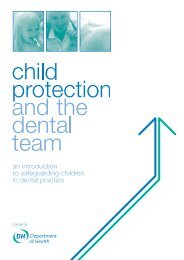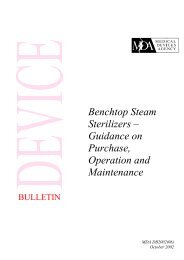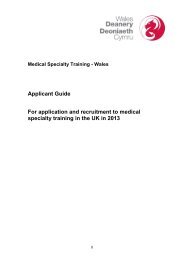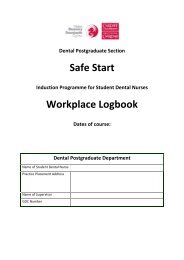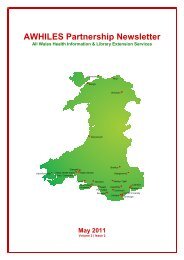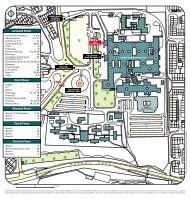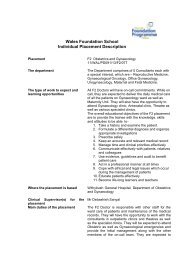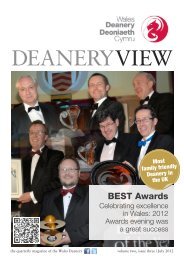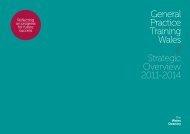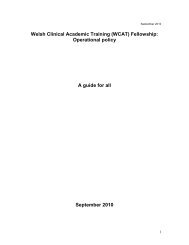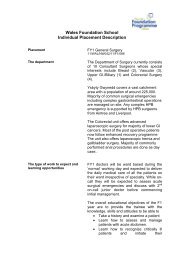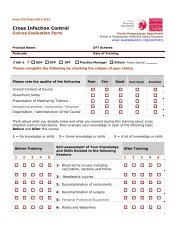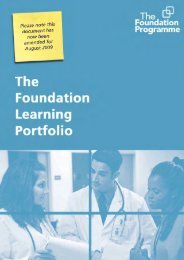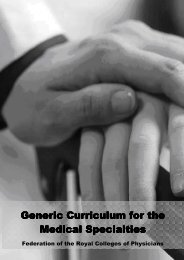The Foundation Programme Reference Guide - Academy of Medical ...
The Foundation Programme Reference Guide - Academy of Medical ...
The Foundation Programme Reference Guide - Academy of Medical ...
Create successful ePaper yourself
Turn your PDF publications into a flip-book with our unique Google optimized e-Paper software.
10. Progressing as a foundation doctor and completing the <strong>Foundation</strong> <strong>Programme</strong>Misconduct10.36 If a foundation doctor is alleged to be bullying, stealing, using the internet forinappropriate purposes etc. this should be managed using normal employer policies.It is important that the matter is brought to the attention <strong>of</strong> the FTPD/T and thedeanery/foundation school. <strong>The</strong> educational supervisor may be required to provideinformation about alleged misconduct to those conducting the investigation on behalf<strong>of</strong> the employer.10.37 <strong>Foundation</strong> doctors must provide information in their e-portfolio relating to probity.This may include the outcome <strong>of</strong> any procedures undertaken by their employers and areflective report. This is in addition to the declaration <strong>of</strong> fitness to practise required bythe GMC when applying for full registration (see www.gmc-uk.org for more details).Assessing and supporting doctors in difficulty10.38 When a concern has come to light, the educational supervisor should ask thoseinvolved to describe, where possible in writing, the actual events that took place.This forms the basis for the discussion with the foundation doctor. <strong>The</strong> educationalsupervisor should arrange an in-depth assessment, looking at the foundationdoctor’s health, attitudes, skills and their training environment, so that they can takeappropriate supportive action. A learning plan should be devised with the foundationdoctor. A summary <strong>of</strong> all discussions should be documented and agreed by thefoundation doctor. All meetings, discussions and assessments should be recorded inwriting.10.39 <strong>The</strong> FTPD/T should be made aware early in the process that there is a problem.10.40 Where a foundation doctor does not acknowledge a problem or fails to engage inthe process the FTPD/T should become involved. More frequent meetings with theeducational supervisor may be required to monitor progress.10.41 <strong>The</strong> FTPD/T should discuss the concerns with the FSD so that appropriate support canbe provided. This will typically include extra assessment, remedial support, includingreferral to a specialist trainee support unit if available, and during F1, involvement <strong>of</strong>the doctor’s medical school. Such action may be separate to or part <strong>of</strong> the employer’sperformance or disciplinary procedure. <strong>The</strong> FSD should work with the deanery toensure all support mechanisms may be accessed to support the foundation doctor.Doctors at risk <strong>of</strong> not completing F1/F210.42 It is expected that the majority <strong>of</strong> foundation doctors will meet the required standardfor satisfactory completion <strong>of</strong> F1 or F2.10.43 If a foundation doctor continues to have difficulties towards the end <strong>of</strong> the trainingperiod and is at risk <strong>of</strong> not meeting the required standard for F1 or F2, the FTPD/Tshould convene a performance review panel.<strong>The</strong> UK <strong>Foundation</strong> <strong>Programme</strong>: <strong>Reference</strong> <strong>Guide</strong>52



